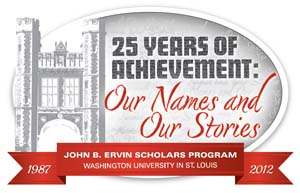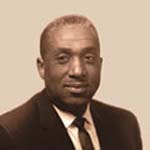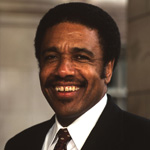The John B. Ervin Scholars Program at Washington University in St. Louis, considered a nationally pre-eminent program that fosters and enhances the overall quality and diversity of WUSTL’s student body, is recognizing its 25th anniversary this weekend.

More than 1,000 alumni, family and friends of the Ervin program are expected to be on campus Sept. 14-16 to participate in “Celebrating 25 Years of Excellence: Our Names and Our Stories.”
The late James E. “Jim” McLeod, vice chancellor for students and dean of the College of Arts & Sciences, founded the Ervin Scholars Program at Washington University in honor of the university’s first African-American dean, John B. Ervin, PhD (1916-1992).
McLeod, who died Sept. 6, 2011, after a two-year battle with cancer, designed the scholarship program to foster a richly diverse educational atmosphere on campus and to enhance the overall quality and diversity of the university’s student body.
The 25th anniversary theme pays tribute to McLeod, whose goal was for the WUSTL community to know every student “by name and by story.”

“Throughout the weekend, we will recognize the hundreds of extraordinary scholars who, in pursuit of academic excellence, service, leadership and diversity, have continued the legacy of Dr. John B. Ervin and Dean James E. McLeod,” says Margaret West, PhD, associate director of the Ervin program and assistant dean in the College of Arts & Sciences.
One of those scholars who is returning to campus for the anniversary celebration is Paul Wright, JD (AB ’91), who was in the first Ervin class in 1987.
“The Ervin program was both empowering and humbling to me and has helped me in numerous ways,” says Wright, who is the assistant general counsel for the Chicago Housing Authority and founder and director of Enterprise Chicago, a professional consulting firm.
“The commitment to service has always been a bedrock principle to the program, and as the son of parents who studied under and respected Dr. Ervin, I felt as if the importance of making a meaningful contribution as an individual was made abundantly clear to me very early on,”
Wright says.
“The anniversary will be a special time for the Ervin program and our university community to look back on those things that we have done well and contemplate those things that we have yet to do,” West says.

“We will pause to remember not only Dr. Ervin and Dean McLeod but also others who held the vision, saw the promise and helped bring the program to fruition.”
Ervin was a nationally renowned black educator, scholar and author. He is remembered for his commitment to excellence, his engagement with the community and his efforts to bring diverse people together to heal divisions among them.
Ervin, who published numerous articles on education in professional journals, was dean of the School of Continuing Education (now University College in Arts & Sciences) at Washington University from 1968-1977.
Presidents Ford and Carter appointed him to the National Advisory Council on Extension and Continuing Education. He also served as vice president of the Danforth Foundation from 1977 until his retirement in 1986 and was a life member of the NAACP.
The Ervin Scholars Program awards between 35 to 45 full-tuition scholarships with $2,500 stipends as well as multiple partial-tuition scholarships to incoming first-year students who demonstrate exceptional intellectual and leadership achievements and who have shown a commitment to community service and bringing diverse people together.
The Ervin scholarship is renewable for all four years of undergraduate study. Scholars are actively involved in the Washington University community and continue the legacy of Ervin on campus.
Anniversary activities
Scheduled 25th anniversary activities include an Assembly Series lecture by civil rights pioneer Ruby Nell Bridges at 4 p.m. Friday, Sept. 14, in Graham Chapel.
Bridges was the first African-American child to integrate an all-white elementary school in the South. Because of threats of violence against the then six-year-old, she was escorted to William Frantz Public School in New Orleans by four federal marshals.
“The Problem We All Live With,” one of Norman Rockwell’s most famous paintings, depicts her historic walk to school on Nov. 14, 1960.
Her Assembly Series talk, “The Power of Our Names, Our Stories,” is free and open to the public.
A symposium, titled “Beyond ‘The Problem We All Live With’: The Meaning of Legacy, Agency and Schooling in the Post-Civil Rights Era,” will be held from 2-3:30 p.m. Sept. 14 in Umrath Lounge.
Sponsored by WUSTL’s African and African-American Studies (AFAS) program, the symposium participants include AFAS Director Garrett Duncan, PhD, associate professor of education in Arts & Sciences, and three Ervin Scholar alumni: Michelle Purdy, PhD (AB ’01, MA ’03), assistant professor of education specializing in race, culture and equity at Michigan State University; Diane Adams (AB ’05), dean of students and family engagement at SPARK Academy; and Fernando Cutz (AB ’10), presidential management fellow at USAID.
Other free and open to the public activities include a dedication Sept. 15 of McLeod’s Way, a new landscaped gathering place located along the path from the newly rebuilt Forsyth Underpass to the Clock Tower on the South 40.
Those attending the 11 a.m. dedication in Graham Chapel will be invited to process to McLeod’s Way, where refreshments will be served. The event is open to the public.
The anniversary activities end with a 1 p.m. Sept. 16 bench dedication in memory of McLeod in Brookings Quadrangle.
For more information about the Ervin Scholars celebration, visit pages.wustl.edu/ervin25 or call (314) 935-7192.